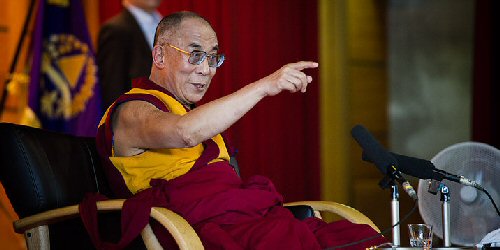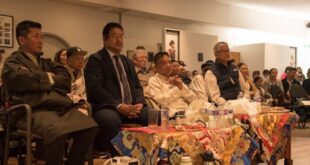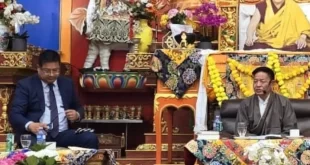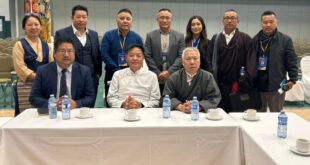March 14th 2011
To the members of the Fourteenth Assembly of the Tibetan People’s Deputies,
It is common knowledge that ancient Tibet, consisting of three provinces (Cholkha-sum) was ruled by a line of forty-two Tibetan kings beginning with Nyatri Tsenpo (127 BCE), and ending with Tri Ralpachen (838 CE). Their rule spanned almost one thousand years. During that time, Tibet was known throughout Inner Asia as a powerful nation, comparable in military power and political influence with Mongolia and China. With the development of Tibetan literature, the richness and breadth of the religion and culture of Tibet meant that its civilisation was considered second only to that of India.
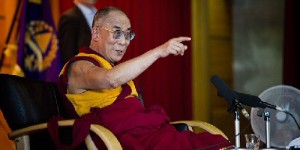
Following the fragmentation of central authority in the 9th century, Tibet was governed by several rulers whose authority was limited to their respective fiefdoms. Tibetan unity weakened with the passage of time. In the early 13th century, both China and Tibet came under the control of Genghis Khan. Although Drogon Choegyal Phagpa restored the sovereignty of Tibet in the 1260s, and his rule extended across the three provinces, the frequent change of rulers under the Phagmo Drupas, Rinpungpas and Tsangpas over the next 380 years or so resulted in a failure to maintain a unified Tibet. The absence of any central authority and frequent internal conflicts caused Tibet’s political power to decline.
Since the Fifth Dalai Lama’s founding of the Ganden Phodrang Government of Tibet in 1642, successive Dalai Lamas have been both the spiritual and temporal leaders of Tibet. During the reign of the Fifth Dalai Lama, all the 13 myriarchies or administrative districts of Tibet enjoyed political stability, Buddhism flourished in Tibet and the Tibetan people enjoyed peace and freedom.
During the late 19th and early 20th centuries, Tibet not only lacked adequate political governance, but also missed the opportunity to develop effective international relations. The Thirteenth Dalai Lama assumed temporal power in 1895, but was compelled to flee to Mongolia and China in 1904, due to the invasion of British forces, and to India in 1910, when the Manchu China invaded. Once circumstances allowed him to return to Tibet, the Thirteenth Dalai Lama re-asserted Tibetan sovereignty in 1913. As a result of what he had learned in exile, the Thirteenth Dalai Lama introduced modern education and made reforms to strengthen the government of Tibet. Although these steps produced positive results, he was unable to fulfil his overall vision, as is evident from his last political testament of 1932, the year before his death. Despite the lacklustre political leadership and short-comings of the regents and their administrations, the Ganden Phodrang Government has on the whole provided stable governance for the last four centuries.
Since I was young, I have been aware of an urgent need to modernize the Tibetan political system. At the age of sixteen, I was compelled to assume political leadership. At that time I lacked a thorough understanding of Tibet’s own political system, let alone international affairs.
However, I had a strong wish to introduce appropriate reforms in accordance with the changing times and was able to effect some fundamental changes. Unfortunately, I was unable to carry these reforms any further due to circumstances beyond my control.
Soon after our arrival in India in April 1959, we set up departments with Kalons (Ministers) in charge of education, preservation of culture and the rehabilitation and welfare of the community. Similarly, in 1960, aware of the importance of democratization, the first Commission of Tibetan People’s Deputies was elected and in 1963 we promulgated the Draft Constitution for a Future Tibet.
No system of governance can ensure stability and progress if it depends solely on one person without the support and participation of the people in the political process. One man rule is both anachronistic and undesirable. We have made great efforts to strengthen our democratic institutions to serve the long-term interests of the six million Tibetans, not out of a wish to copy others, but because democracy is the most representative system of governance. In 1990, a committee was formed to draft the Charter for Tibetans-in-Exile and a year later the total strength of the Assembly of Tibetan People’s Deputies (ATPD), the Tibetans in exile’s highest law-making body, was increased. In 1991, the Eleventh ATPD formally adopted the Charter for Tibetans-in-Exile and assumed all legislative authority. Given the limitations of our life in exile these are achievements of which we can be proud.
In 2001, the Tibetan people elected the Kalon Tripa, the political leader, directly for the first time. Since then, I have been in semi-retirement, no longer involving myself in the day-to-day administration, but able to dedicate more time to general human welfare.
The essence of a democratic system is, in short, the assumption of political responsibility by elected leaders for the popular good. In order for our process of democratization to be complete, the time has come for me to devolve my formal authority to such an elected leadership. The general lack of experience and political maturity in our democratic institutions has prevented us from doing this earlier.
Given that the line of Dalai Lamas has provided political leadership for nearly four centuries, it might be difficult for Tibetans generally and especially those in Tibet to envisage and accept a political system that is not led by the Dalai Lama. Therefore, over the past 50 years I have tried in various ways to raise people’s political awareness and encourage their participation in our democratic process.
In my 10th March statement of 1969, for instance, I stated, “When the day comes for Tibet to be governed by its own people, it will be for the people to decide as to what form of government they will have. The system of governance by the line of the Dalai Lamas may or may not be there. In particular, the opinion of the forward-looking younger generation will be an influential factor.”
Similarly, in my 10th March statement of 1988, I stated, “As I have said many times, even the continuation of the institution of the Dalai Lama is for the people to decide.” Since the 1980s, I have repeatedly advised the Kashag, ATPD and the public that Tibetans should take full responsibility for the administration and welfare of the people as if the Dalai Lama were not there.
I informed the Chairman of the Thirteenth ATPD and the then Chief Justice Commissioner that I should be relieved of functions related to my political and administrative status, including such ceremonial responsibilities as the signing of bills adopted by the legislative body. However, my proposal was not even considered. On 31st August 2010, during the First Tibetan General Meeting (organized by ATPD), I explained this again in detail. Now, a decision on this important matter should be delayed no longer. All the necessary amendments to the Charter and other related regulations should be made during this session so that I am completely relieved of formal authority.
I want to acknowledge here that many of my fellow Tibetans, inside and outside Tibet, have earnestly requested me to continue to give political leadership at this critical time. My intention to devolve political authority derives neither from a wish to shirk responsibility nor because I am disheartened. On the contrary, I wish to devolve authority solely for the benefit of the Tibetan people in the long run. It is extremely important that we ensure the continuity of our exile Tibetan administration and our struggle until the issue of Tibet has been successfully resolved.
If we have to remain in exile for several more decades, a time will inevitably come when I will no longer be able to provide leadership. Therefore, it is necessary that we establish a sound system of governance while I remain able and healthy, in order that the exile Tibetan administration can become self-reliant rather than being dependent on the Dalai Lama. If we are able to implement such a system from this time onwards, I will still be able to help resolve problems if called upon to do so. But, if the implementation of such a system is delayed and a day comes when my leadership is suddenly unavailable, the consequent uncertainty might present an overwhelming challenge. Therefore, it is the duty of all Tibetans to make every effort to prevent such an eventuality.
As one among the six million Tibetans, bearing in mind that the Dalai Lamas have a special historic and karmic relationship with the Tibetan people, and as long as Tibetans place their trust and faith in me, I will continue to serve the cause of Tibet.
Although Article 31 of the Charter spells out provisions for a Council of Regency, it was formulated merely as an interim measure based on past traditions. It does not include provisions for instituting a system of political leadership without the Dalai Lama. Therefore, amendments to the Charter on this occasion must conform to the framework of a democratic system in which the political leadership is elected by the people for a specific term. Thus, all the necessary steps must be taken, including the appointment of separate committees, to amend the relevant Articles of the Charter and other regulations, in order that a decision can be reached and implemented during this very session.
As a result, some of my political promulgations such as the Draft Constitution for a Future Tibet (1963) and Guidelines for Future Tibet’s Polity (1992) will become ineffective. The title of the present institution of the Ganden Phodrang headed by the Dalai Lama should also be changed accordingly.
With my prayers for the successful proceedings of the house.
Tenzin Gyatso, the 14th Dalai Lama
11th March 2011
Note: Translated from the Tibetan original, which should be considered final and authoritative.
